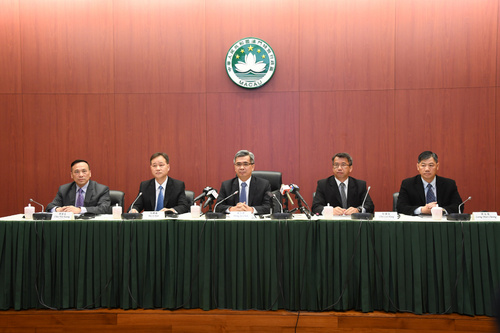 The Secretary for Security, Mr Wong Sio Chak, announces crime figures of 2016 at a press conference.
The Secretary for Security, Mr Wong Sio Chak, announces crime figures of 2016 at a press conference.
The number of suspected crime cases reported in Macao in 2016 saw a 5.4 percent increase year-on-year, to 14,387 cases. Instances of the most serious forms of crime continued to be either non-existent, or extremely low in number.
The rise in the number of reported cases was mainly due to enhanced enforcement efforts against those temporary stay permit holders that failed to report to the police on a regular basis as required, said the Secretary for Security, Mr Wong Sio Chak, during today’s press conference on the 2016 crime figures.
The security authorities would continue their scientific and progressive approach to maintaining law and order in Macao and would constantly analyse any possible impact on law and order following the adjustment period of the city’s gaming industry, he said.
Suspected crimes against property and reported crimes against the person accounted for, respectively, 53.2 percent and 20.2 percent of all the suspected criminal cases reported in 2016.
There were 840 cases of suspected violent crime in 2016, an increase of 11.3 percent from 2015. The increase was mainly due to a rise in allegations relating to false imprisonment. However, the pace of year-on-year increase in the number of suspected violent crimes during 2016 slowed during the course of the 12 months: from a 24 percent year-on-year increase in the first quarter, to an average year-on-year increase of 11.3 percent by year end.
Instances of other serious suspected crimes, such as murder, kidnap, and grievous assault, remained at zero or a very low level. Instances of suspected robbery dropped by 13.3 percent, to 98 cases compared to the 2015 data. The decline showed Macao to be a secure and safe city, said Mr Wong.
In addition, the police had taken effective measures to prevent and combat crimes relating to people’s material well-being, such as burglary, fraud, and arson. Burglary decreased to 53 cases in 2016 from 189 cases in 2014; and telephone fraud fell to 29 cases from 282 cases in 2014.
The number of suspected illegal immigrants and overstayers apprehended during 2016 totalled 28,061, representing an 8-percent year-on-year decline. The reduction in the number was a result of the implementation – with effect from October 2015 – of anti-smuggling arrangements with neighbouring authorities, Mr Wong said.
The number of reported drug-related cases was basically the same as in 2015, the Secretary said. Mr Wong added that the police would remain vigilant regarding trends in suspected drug-related crime, via further, effective, intelligence gathering and closer cooperation with international and regional police authorities.
Regarding suspected gaming-related crimes, false imprisonment rose 22.9 percent year-on-year, to 504 cases, while suspect cases of usury went up 32.5 percent, to 469 cases.
Mr Wong said the security authorities had not found evidence that the city’s gaming industry had had any negative influence on community security. The police were nonetheless paying close attention to the development of the sector and adjusting their enforcement strategies as necessary.
Additionally, reported infractions relating to taxi services totalled 4,152 instances: complaints of surcharging went up 38.9 percent year-on-year, to 1,713 cases; while complaints of alleged refusals to take passengers declined by 24.6 percent compared to 2015, to 1,413 cases.
Full-year data indicated that reported infractions relating to unlicensed transportation services totalled 1,287 cases. Of these, 1,078 related to services accessed via mobile device applications, said Mr Wong.
The Secretary concluded by saying that the work of Macao’s security authorities in the past year had won wide positive recognition from the community. By promoting close police-community cooperation, the police would step up efforts in preventing and combating crime, in order to maintain a stable and secure environment in Macao and protect the legitimate rights of both residents and visitors.


